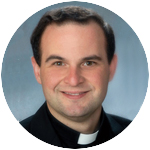
Father Eric J. Banecker
As we approach the conclusion of the annus horribilis, this year of our discontent, many people are literally breaking down, either physically or emotionally, unable to handle the terrible diseases that have been unleashed.
I say “diseases” because, while so much of our attention is rightly directly to COVID-19, it should become obvious that many other diseases have wounded our bodies and our body politic this year. A sense of malaise and meaninglessness, anger and resentment, a failure to trust each other: all of these and more have consumed us, stressed us out, and given us great reason to be concerned about our future.
Despite what some have suggested, our hope lies not in mass vaccination. That would undoubtedly be a good thing, and we should be grateful for researchers who are making that possible. But there are deeper wounds and more existential threats than the coronavirus. Our hope, then, must lie somewhere else. Or, for Christians, in someone else.
[hotblock]
At almost every Mass, immediately after the congregation has prayed the prayer Jesus taught to his disciples, the priest says this:
Deliver us, Lord, we pray, from every evil
Graciously grant peace in our days
That by the help of your mercy
We may be always free from sin and safe from all distress
As we await the blessed hope, the coming of our savior Jesus Christ.
This beautiful prayer gets to the heart of Advent and, in an odd way, to the heart of 2020. I don’t think there is a single person I know that has not been affected by this year, whether they were affected directly by the virus or not.
That is a necessary reminder that we are not islands, as Pope Francis reminds us in Fratelli Tutti. Whether we want it or not, we are all connected to each other. To borrow an image from de Lubac, there is no such thing as a lone victor carrying a rose through a battlefield.
Advent is the season of longing, of expectation, of waiting for what we only vaguely understand yet knowing in spite of that how desperately we are in need of it. And that brings me to that prayer, the technical name of which is the embolism. In it, everything we believe about Advent is contained in a neatly packaged form.
First, it is the Lord who delivers us from evil. We often expect too much from government and other powerful institutions. We want them to free us from fear, war, poverty, discomfort and inconvenience. But true evil – which is what we actually want to be rid of – is something only God can address. Only he can right the wrongs of history. And because of that, he is the one who brings true peace.
It was said of the Romans during the Empire, “they make a desert and call it peace.” Perhaps something similar can be said of the Pax Americana. But peace in our days is a gift which comes to us from God. It is offered to everyone who chooses to follow him, even when things get difficult.
Mercy is also at the heart of Advent, precisely because it is a time to reflect on our absolute need for God. I’ve come across many people who are completely averse to going to confession. Often, they express some sense of not wanting to “go there” in their hearts or a vague sense that they don’t really do anything wrong. Yet, we need confession for the same reason we need Christmas: because we need God. There is a God and he’s not me. I am in need of a savior. How important it is to remember this during Advent!
The end of the prayer is my favorite part, about “await(ing) the blessed hope.” Advent is the preeminent season of Christian hope. The major figures of Advent — Isaiah, John the Baptist, Mary and Joseph — are all figures of hope, who point with their words and lives the nearness of the Kingdom of God.
We all have, as Pope Benedict XVI wrote, those little hopes that get us through the day. Maybe I’ll get a promotion. Maybe I’ll get what I want for Christmas. There is nothing wrong with any of that. But none of that is the blessed hope. That belongs to the promise of a savior.
The good news is that that savior has come once already, in a hidden and mysterious form. Because of that, we can hope with confidence in his coming in glory. On that day, there will be no more ambiguity about the matter. On that day, Christ will be revealed definitively to all as the hope of the nations and their savior. He is the axis on which the world turns. In him, every human life finds the meaning of its existence.
And so, yes, there is an answer to what ails us in 2020. But it isn’t a technocratic answer. It’s not the kind of thing we can protest for. It is a quiet but all-pervasive hope which lightens our darkness like four candles flickering in the wind.
***
Father Eric J. Banecker is parochial administrator of St. Francis de Sales Parish, Philadelphia.
PREVIOUS: Mary of Guadalupe, symbol of hope and renewal
NEXT: Three popes, one catechism declare: Death penalty ‘inadmissible’


Share this story